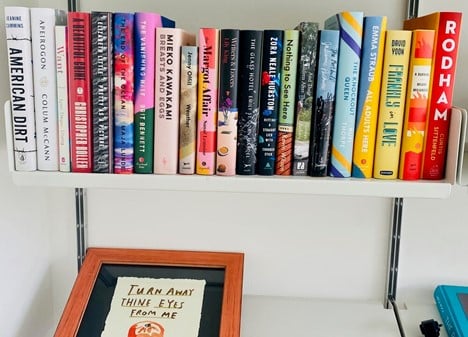|
Getting your Trinity Audio player ready...
|
Perusing fiction in 2020 was a demonstration of disobedience of dismissing our consideration from the calamities working out around us to participate in a tranquil, innovative demonstration. Furthermore, the year’s best fiction offered numerous ways toward more prominent agreement and important break. Regardless of whether in the turbulent corridors of force in Tudor England with The Mirror and the Light, a tempest assaulted chateau in A Children’s Bible or a phantom filled Japan with Where the Wild Ladies Are, perusers could discover happy, exciting interruption, models of versatility and sympathy and difficulties that by one way or another caused our own to feel more tolerable.
Here, the best fiction books of 2020.
5. Country Elegies, Ayad Akhtar:
Sometimes we are talented a novel that joins profound insight, careful writing and something significant to say about the condition of our reality. In Homeland Elegies, Pulitzer Prize champ Ayad Akhtar gives perusers only that in the account of a man a lot of such as himself, who shares his name and was destined to Pakistani workers in the American Midwest as Akhtar, were. From the initial parts when the anecdotal Ayad’s dad treats Donald Trump for a heart condition during the 1990s, it’s reasonable we are in a world that is unmistakable yet not really genuine. That is all important for Akhtar’s point: his venture utilizes fiction as a channel through which to recount a fundamental tale about a man confronting the unrest of American life after 9/11 and his family’s chaperon battle to characterize itself. It’s a fragile difficult exercise between what’s genuine and what may not be, yet in Akhtar’s splendid book the intricacies of the American Dream have never been so bare.
4. A Children’s Bible, Lydia Millet:
On an excursion like no other, a gathering of families share a lakeside summer home, where the guardians care minimal about what their youngsters are doing. At the point when a cataclysmic tempest tears through the house, the grown-ups decide to disregard the turmoil and go to the alcohol bureau all things considered, leaving the children to look for security all alone. In the thin and propulsive novel, teen Evie portrays the gathering’s battles amidst prophetically calamitous degrees of pulverization. Her considerations on the prospering catastrophic event catch the double characters of a pouting teenager, tired of her folks, and a youngster compelled to grow up excessively quick. Pulitzer Prize finalist Lydia Millet’s epic, which was a National Book Award finalist, is both an experience story suggestive of the works of art and an admonition story of an inauspicious future told through the eyes of an age awfully alright with disaster.
3. The Mirror and the Light, Hilary Mantel:
Scarcely any books were as enthusiastically foreseen for the current year as The Mirror and The Light, the end to British writer Hilary Mantel’s blockbuster Wolf Hall set of three. Shelf’s summoning of Tudor England and her ear for political show were similarly as vivid as could be expected, and the book moved to the highest point of hit records in the U.S. furthermore, U.K. In 900 luxuriously definite pages, The Mirror and The Light spreads out the defeat of Thomas Cromwell, consigliere to King Henry VIII and powerbroker of the Reformation. It’s chronicled fiction, yet brilliantly abstract in its aspirations and emotional in the cut and push of its exchange. Shelf’s Cromwell is a character for the ages unpleasant edged at this point reflective, with a brain as sharp as a hatchet. Her Henry, in the mean time, is an able update that self indulging men with larger than usual personalities appreciated force some time before the present.
2. Shuggie Bain, Douglas Stuart:
Douglas Stuart’s acclaimed debut novel attracts vigorously on his childhood 1980s Glasgow, where, similar to Stuart did, Hugh “Shuggie” Bain is growing up with a drunkard mother and confronting a culture of homophobia that causes him to feel like an untouchable. His dad and two more established kin have ventured out from home, well before he can. Against the background of a city disregarded by the public authority and in decrease, Shuggie and Agnes wrestle for power over their lives, frequently ending up cleared away by the rushes of her dependence. While the setting is depressing, covered with depictions of calm insults. Agnes’ late-night calls to her ex’s taxi organization, waiting mugs loaded up with day-old lager the controlling light of the novel is the kid’s suffering adoration for his mom. Stuart composes flawlessly noticed inward lives for the two characters, catching Shuggie’s commitment to his occasionally fiery and glitzy mother and the agony that comes from seeing her changed into a scornful, unusual outsider by drink. The tale, a National Book Award finalist and victor of the Booker Prize, is a gut punch.
1. The Vanishing Half, Brit Bennett:
Brit Bennett’s The Vanishing Half lives right external the domain of authenticity, in that space where a hint of imagination serves to underscore the peculiarity of the real world. In her subsequent novel, Bennett concocts the little Black town of Mallard, La., where the inhabitants highly esteem their fair complexion, and indistinguishable twins Stella and Desiree Vignes are experiencing childhood during the 1950s all around mindful of racial brutality and persecution. It feels practically unavoidable, at that point, whenever the young ladies flee together looking for better freedoms and soon Stella settles on the choice, simple from the start and harder with time, to pass as white. Abruptly, she’s gone, leaving a crushed Desiree behind. Bennett weaves a layered and fulfilling account that shifts through time and numerous characters’ points of view to follow the effect of a solitary choice on Stella, her family and the future. An articulate new passage to writing on that generally imperative of subjects, character, The Vanishing Half is the novel of the year.

